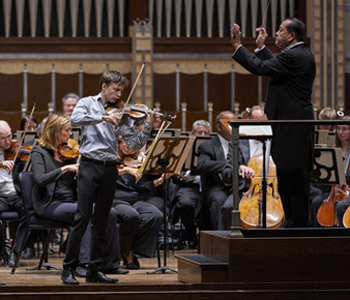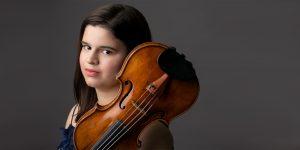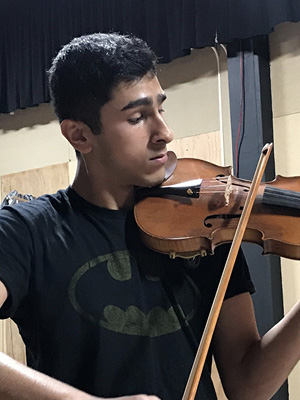by Mike Telin

At stake is a grand prize of $20,000, in addition to second and third prizes of $10,000 and $5,000, respectively. The Competition will continue into next week and culminate with the three finalists playing concertos with The Cleveland Orchestra under the direction of Gemma New (replacing Bramwell Tovey) in Severance Hall on Friday, July 26 at 7:30 pm. (See our concert listings for details about the semi-final, concerto and recital rounds that will determine who plays in the finals.)
All performances at Oberlin are free. Tickets for the July 26 Concerto Finals at Severance Hall range from $13-$30. Tickets may be purchased online or by calling 800-686-1141. Student tickets are free with a paying adult. All rounds held in Oberlin will be live-streamed on www.oberlin.edu/cooper. The Recital Round at Oberlin and Concerto Finals at Severance Hall will be broadcast on WCLV FM 104.9. The Recital Round will be broadcast on delay on Thursday evening, July 25.
This Competition marks the final time that Gregory Fulkerson, a longtime professor of violin at Oberlin who retired in spring 2017, will serve as director and jury chair. In a 2017 interview with this publication, Fulkerson said that while the prize money is an incentive for young musicians to apply to the Competition, the opportunity to perform with The Cleveland Orchestra on the Severance Hall stage is a huge draw. “It’s not just how good it looks on their resumes,” he said. “Performing with the Orchestra will be one of the first times they will get to experience something in which everything is better than they could imagine. They really don’t know what an orchestra is capable of doing, so it’s an unforgettable moment when we get to the finals and see the kid’s faces light up.”
We spoke to contestants Rabia Brooke and Enrique Rodrigues.

Brooke is a 2019 National YoungArts Foundation Merit Winner and Paul Vermel Young Artists Awardee and was the winner of the 2018 Chicago Youth Symphony Orchestra Concerto Competition. She has served as co-concertmaster of the Chicago Youth Symphony Orchestra and is a founding member of the Asrai Quartet. In addition to participating in the Cooper Competition this summer, she will attend the Aspen Music Festival and School where she will study with Naoko Tanaka. “I’m looking forward to coming to the Cooper,” Brooke said by telephone. “This will be my first international competition that is live — I’ve done some on-line ones. And yesterday I was accepted into the Spohr International Competition in Weimar, Germany.”
The violinist said that she chose her competition repertoire with the help of her teacher, Desirée Ruhsrat. “Some pieces I chose out of personal preference but I like playing them,” adding that if she had to choose only one, it would be the Sibelius Concerto. “I performed it with the Chicago Youth Symphony in Orchestra Hall, but over the past few months I feel like I’ve really gotten to know it. It does present a number of interpretive challenges, particularly the opening, which I find is difficult to pull off.”
Brooke will also play two movements from J.S. Bach’s Sonata No. 2 in a. “This piece is difficult because in the Andante there are two voices that need to be brought out, but one needs to be more prominent than the other. You also have to sustain the line while playing those two voices, which is a challenge.”
Two pieces that are new to her are Wieniawski’s Faust Fantasy and Dvořák’s Romance in f. “I fell in love with the Dvořák as soon as I started learning it. It has such beautiful melodies and rich harmonies.”
When asked what attracts her to the violin, she said it is the lyrical quality of the instrument. “You can really make it sing, and for me, it’s the closest to the human voice.”
In addition to performing with many well-known classical musicians, Brooke has shared the stage with the Grammy-nominated banjoist Noam Pikelny and the bluegrass band, Special Consensus. “That was memorable because I don’t play that kind of music, but ever since then I have loved it.”
The young violinist also possesses an entrepreneurial sense — she serves as Artist in Residence at her own Buckingham Salon Series. “These are concerts that I present at my house. I’ve done solo and chamber pieces and I find that these are great ways to showcase my repertoire. I invite my neighbors and friends and seventy-five people will show up.”
In the fall, Brooke will begin her undergraduate studies at the Juilliard School. “Last November I attended a studio class of Catherine Cho and I loved the environment. I’ve had a couple of lessons with her and she feels like the perfect match. She brings a combination of technical and musical ideas to her teaching. I worked on the Sibelius Concerto with her and she brought the piece to life by talking about all the colors, and the character and also how to practice it.”
Although she first had aspirations of becoming a soloist, when she began playing in the youth orchestra it opened up her horizons. “Now I can see myself as a concertmaster of an orchestra, perhaps in Europe.” I asked if she had any particular one in mind? “The Royal Concertgebouw. I think the sound of that orchestra is incredible and the Hall is one of the most gorgeous in Europe.”
How does she spend her time when she’s not playing the violin? “I like to swim and I love to travel. I enjoy learning languages and just walking along Lake Michigan.”

Rodrigues said that he looks forward to the Cooper Competition. “My teacher, Mr. I-Hao Lee at Juilliard Pre-College, told me about it. He said it was a good competition and I should apply. I looked at the information and decided to do it,” he said during a telephone conversation. The reason I wanted to participate was not only to meet great musicians, but to take my performance to the next level in terms of technique, and everything that goes along with performing.”
The violinist said that there was a specific reason for choosing each piece on his repertoire list. “But the reason that connects them all is that I feel a certain motivation to practice them. I really like the Bruch g minor — it was one of the first concertos I learned and I wanted to bring it back for this competition. The Ysaÿe Sonata No. 3 is technically challenging and it showcases technique, and I’ve always had a special connection to Bloch’s Nigun.”
Rodrigues was recently invited to perform on National Public Radio’s From the Top, which he said was a fantastic opportunity. “I traveled to Los Angeles and met the most amazing group of young musicians from all around the country. We had a bunch of workshops, performances and recording sessions throughout the week. We went to Hollywood Studios and performed our own segments for the show and that was an awesome experience.”
While in LA, the musicians also participated in Introspection workshops, which are designed to help the young players gain insight into their personal strengths and weaknesses. “As musicians, when you go onstage you are at you most vulnerable — all your emotions come out. If you can hone in on the emotions that you want, you stand a better chance of coming off as confident — expressing emotions that you want to give to the audience.”
The players also participated in community outreach sessions. “We met a group from the Street Symphony Orchestra, and talked about outreach. We learned about how we can do more for our community. I think we all grew as people because of it.” Street Symphony places social justice at the heart of music-making by creating authentic, powerful engagements between professional and emerging artists and communities disenfranchised by homelessness and incarceration in Los Angeles County.
“Vijay Gupta is the founder and artistic director. He was a violinist in the LA Philharmonic. They go and perform for the homeless and help serve them meals. I think we all gained a better understanding about their lives and what we as citizens can do.”
Community outreach is something that the violinist has been involved in for a very long time. “My grandmother suffered from Alzheimer’s, and whenever I or my sister would play for her she would become so happy, and you could see the emotions pouring out of her. She couldn’t remember the simple things in life, but she could remember how beautiful music sounded.”
Rodrigues said that after he, his sister and his parents saw the impact that music had on his grandmother, they decided to start performing in nursing homes across New Jersey. “My dad would sing, my sister would play the piano and I’d play the violin. When we would arrive they would just be sitting there but as soon as the music started, there was a social interaction between us and the audience. It was something beautiful to see.”
Rodrigues’ passion for serving the community continues — he is the co-regional director of the Back to Bach Project, a global initiative ‘to inspire music and arts education to young children, and to teach them the value of hard work and passion.’ “It was started by cellist Noah Lee and his sister and I was at the first event. It’s grown into an international organization and is now in Canada, Taiwan, and Poland.”
Wrapping up our conversation, the topic turned to academics. “I have a curiosity for math, physics, and astronomy,” he said, adding that he plans to incorporate these subjects into his life goals. “I would love to have a career as a concert violinist, but I would also like to pursue a career in astrophysics.”
Photo of the 2017 Cooper finals at Severance Hall by Roger Mastroianni.
Published on ClevelandClassical.com July 17, 2019.
Click here for a printable copy of this article



